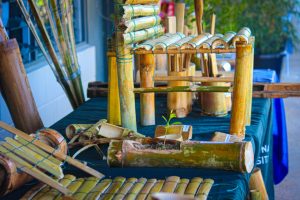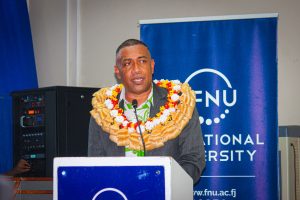

Fiji’s growing investment in bamboo research has revealed promising results, with studies confirming that the plant possesses strength comparable to timber, making it a viable material for structural applications.
The research, conducted by Asheel Kumar from the Fiji National University (FNU) and by Dr Patrick Singh focused on Bambusa vulgaris, locally known as Bitu Ni Vavalagi.
This was highlighted by the Minister for Fisheries and Forestry, Honourable Alitia Bainivalu, during the World Bamboo Day celebration at FNU’s Koronivia Campus.

“I am proud to share the progress we have made in Bamboo Research and Development in Fiji through the Ministry’s R&D project and GGGI’s Fiji Bamboo for Adaptation and Mitigation Project, supported by the New Zealand Ministry of Foreign Affairs and Trade, the Government of Ireland, Department of Foreign Affairs and the Indonesian government through the Indonesian Embassy in Fiji,” Honourable Bainivalu said.
“The bamboo project has brought together government ministries, FNU, the Fiji Bamboo Association, the private sector, and international organisations such as Base Bahay Foundation, ensuring a strong coalition for bamboo development in Fiji.”
Honourable Bainivalu added that Fiji is also assessing Cement Bamboo Frame Technology (CBFT), used successfully in the Philippines, India, and Nepal to build thousands of cyclone-resilient houses.
“Skills training in bamboo cultivation, harvesting, treatment, and product development will now be supported through the Indonesian Embassy, under a Grant Agreement that was officially formalised yesterday with the Ministry of Forestry,” she said.
“This Agreement, valued at approximately FJD $475,299.58 and will provide direct support towards the development of bamboo industry products in Fiji. As part of this partnership, 12 Fijian bamboo entrepreneurs and 4 representatives from the Ministry of Forestry will undertake an 18-day training programme in Yogyakarta, Indonesia, covering areas such as bamboo material cutting and storing, furniture production techniques, and the design and planning of bamboo projects.”
Global Green Growth Institute(GGGI) Regional Director-Pacific Sakiusa Tuisolia said that bamboo plays a crucial role in the fight against climate change.
“It absorbs carbon dioxide faster than most trees, helps restore degraded lands, and provides low carbon alternative to timber and cement. At a time when Fiji and the Pacific face increasing climate threats, bamboo is not just a plant-it is part of our solution,” Mr Tuisolia said.
“Today, as we mark world bamboo day, let us go beyond celebrations. Let this be a call for action. Once we have gone past the ‘proof of concept’ stage, we must invest in bamboo nurseries, processing facilities, and community enterprises. We must encourage innovation, research, and partnerships to unlock the potential of bamboo for Fiji’s sustainable future,”
FNU’s College of Agriculture, Fisheries and Forestry Dean Dr Kaliova Ravuiwasa said as a university, it is committed to ensuring that graduates leave with the knowledge and passion to champion bamboo as part of Fiji’s green development.

“For us at the Fiji National University, bamboo is an important subject of academic study. Our researchers and students are exploring bamboo diversity and conservation, its resilience under climate stresses, and its strength as a sustainable material,” Dr Ravuiwasa said.
“Today, we are reminded that bamboo is much more than a plant. Known as the “green gold” of nature, it grows rapidly, regenerates easily, and thrives with minimal resources. In Fiji and across the Pacific, bamboo has long been part of our way of life, whether in traditional building, weaving, or as a source of food. Now, it is also being recognised as a key resource for our future, offering solutions for sustainable housing, eco-friendly industries, and climate resilience.”